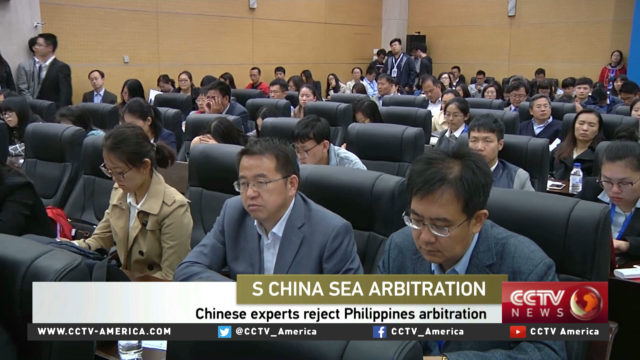A South China Sea arbitration case filed by the Philippines was at the top of the agenda at the annual meeting of the Chinese Society of International Law.
CCTV’s Tang Bo reports.

About 300 Chinese legal experts gathered in Changchun, Jilin province to discuss the case. Their analysis was unanimous: China should abstain from participating in the case, because the arbitration panel has no jurisdiction over the dispute. They believed China has legitimate rights under international law to reject the arbitration.
“That is because the tribunal that arbitrates maritime disputes under the U.N. Convention on the Law of the Sea, has no jurisdiction over Manila’s claims,” China University of Political Science and Law Professor Ma Chenyuan said. “And the country’s unilateral initiation of the arbitration broke the agreement with us that the disputes should be resolved through bilateral negotiations.”
In October 2015, the Arbitral Tribunal at the Hague concluded that it has jurisdiction over the matters raised in seven of the Philippines’ claims.
China has issued a statement saying the award has no binding effect on the country. It will neither participate in, nor accept the arbitration.
“It is not the case that China does not want to resolve the issue. We want to resolve the territorial disputes through negotiations, as we have stated clearly in our agreements with the Philippines and the Declaration of Conduct with ASEAN,” Director General of the Foreign Ministry Dept. of Boundary and Ocean Affairs Ouyang Yujing said. “The unilateral arbitration case has been illegal in the first place.”
China has recently reached a consensus with Brunei, Cambodia, and Laos on the South China Sea issue. The four countries have agreed to oppose any attempt to unilaterally impose an agenda on other countries.
The experts at the meeting said that sets an example for the Philippines on how territorial and maritime disputes can be resolved through one-on-one consultation and negotiations, to maintain peace and stability in the region.
 CGTN America
CGTN America
